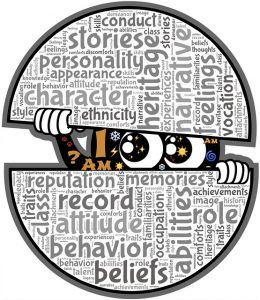Who Cares?
Why would anyone want to read my memoirs?

Who am I to think my story is worth writing down? Who cares? And if nobody cares, why should I bother? What’s the point?
There are two main questions here:
1. Who do I think I am?
2. And who am I writing it for, anyway?
The first question indicates a lack of confidence or a sense of insecurity, possibly about your writing ability or the value of your life story. Questioning yourself and the value of your story happens because you don’t know the answer to the second question, ”Who is my audience”? Until you figure out that answer, there is no apparent point to doing the work.
The second question: “Who am I writing it for?”
Your story is valuable. It is, or could be, an important historical document that records the times we live in. Even if your family and friends don’t care, aren’t interested, or think you’re getting above yourself, your story still has a great deal of value to others.
How about your future descendants? Imagine — it’s the year 2120. Imagine what it would feel like for your great-great-great grandson to hold in his hands a life story, hand-written or printed on paper by his ancestor who lived through the excitement and pride of watching an old black-and-white television set as the the first man landed on the moon. Imagine what he’d think, reading about the first e-mail you’d ever received or surfed this new thing, the internet for the first time. How backward and quaint that might seem to your descendants a century or two from now.
 What other kinds of things could you write about? Which vague family legends could be clarified by a first-person account written by a participant in the events?
What other kinds of things could you write about? Which vague family legends could be clarified by a first-person account written by a participant in the events?
My family has several word-of-mouth stories about my great-grandfather, a sea-captain with a fleet of sailing ships out of Mystic Harbour in the 1800’s. I would love to read a first-hand account of what really occurred during his ship’s narrow escape from the Patagonian natives, or the time he was kidnapped and sent to France, but unless I can find his ship’s logs, I’ll never know for sure what he experienced. All I have are the snippets of stories my father told me, passed down from his mother about her father whom she seldom saw, as he was always off on another year-long voyage. I no longer know what was true and what was imagined or embellished.
Your story is an integral part of the history of humanity. You might consider having your memoirs posted on something like “Ancestry.com” posthumously, so that your descendants and relatives can meet you in the future and round out their own autobiographies. What kinds of events happened in your life that might seem exotic and wonderful to a descendant two or more generations from now? Society and social values are changing at such a frenetic rate that what we consider to be modern and cool will be obsolete, laughable and even incomprehensible, probably within our own lifetime.
Okay, good enough. Who else, then? How about historical researchers? The everyday things you take for granted, things which seem beneath consideration, might be utterly fascinating to an historian a century or two from now. One of the most valuable pieces of research material regarding the daily habits and interactions of the Restoration period in England is the diary of Samuel Pepys. An excerpt from Wikipedia says:
“The detailed private diary that Pepys kept from 1660 until 1669 was first published in the 19th century and is one of the most important primary sources for the English Restoration period. It provides a combination of personal revelation and eyewitness accounts of great events, such as the Great Plague of London, the Second Dutch War, and the Great Fire of London.”
Back to the first question: “Who do I think I am?”
 In the end, though, it doesn’t matter who else cares about your story. You must write because you want to do so. Even if your story doesn’t comprise a list of heroic adventures, massive achievements or life-changing inspiration, it has value. It’s valuable as an historic document, yes, but it also has a great deal of personal value as well.
In the end, though, it doesn’t matter who else cares about your story. You must write because you want to do so. Even if your story doesn’t comprise a list of heroic adventures, massive achievements or life-changing inspiration, it has value. It’s valuable as an historic document, yes, but it also has a great deal of personal value as well.
Here’s a quote from a posting on Reddit.com:
“When I actually stop and think about the reality of my life as a whole I often times realize things about the way that I am or the things that I think that relate directly to past experiences, that I never would have realized unless I purposefully thought about them.”
A third question: Why bother?
Writing your life story forces you to confront and investigate memories, irrational fears and phobias you may have suppressed, relive moments of magic and mystery, answer questions which lay hidden for decades, and ultimately learn to know yourself on a much deeper and fundamental level.
And even if there’s no other reason, that is what makes the effort worthwhile.
Happy Writing!

